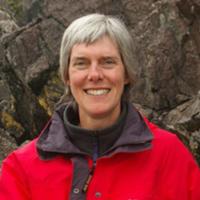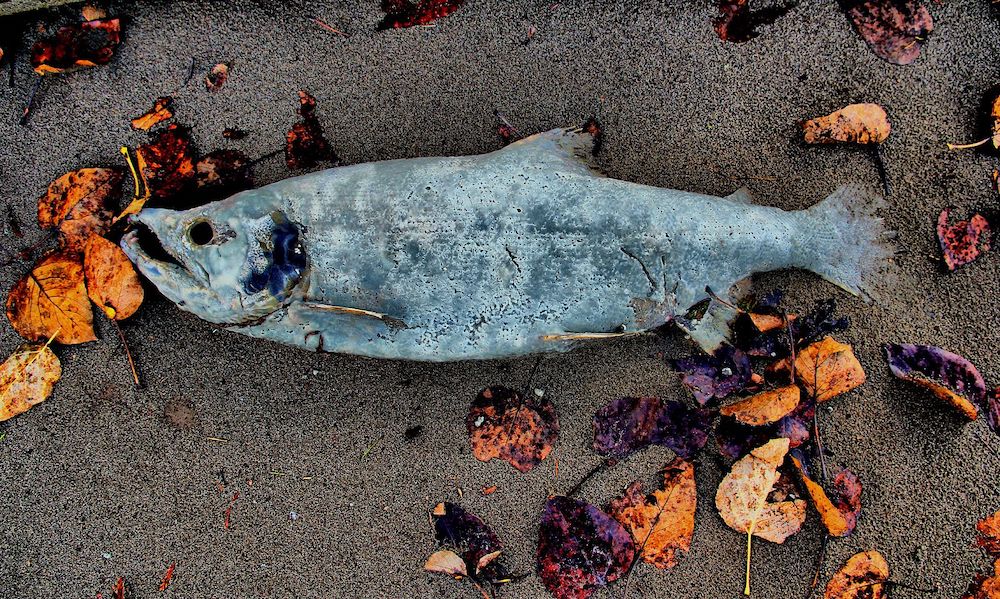When Dalton Silver, chief of the Sumas First Nation, located south of the Fraser River near Abbotsford, B.C., thinks back to the 2009 Fraser River sockeye salmon run, the first word that comes to his mind is “alarming.” That year, after two decades of steep declines, just 1.6 million of an anticipated 10.6 million sockeye returned from the Pacific Ocean to make their way upriver to spawn. The gap between prediction and reality was shockingly big. But even more ominous for the fish’s future — the number of spawners was well below what would be needed for the fish to replace themselves.
The 2009 crisis triggered a high-profile federal commission led by BC Supreme Court Justice Bruce Cohen. His 1,191-page final report, published in 2012, presented 75 recommendations to turn things around for the beleaguered salmon. Yet eight years later, the alarm bells are ringing louder than ever. This year, a mere 288,000 sockeye showed up in the Fraser — the lowest run on record.
“It’s pretty bleak,” says Silver, who serves as the fisheries representative for the Union of British Columbia Indian Chiefs. “And I don’t see much in the way of implementing the recommendations made by the Cohen Commission.”
The Canadian federal government’s assessment of its performance stands in sharp contrast to Silver’s. In October 2018, Fisheries and Oceans Canada declared that it had “acted on” 100 per cent of Cohen’s 75 recommendations — even as it noted that “acting on many of the recommendations is an ongoing, incremental task.”
Stan Proboszcz, the science advisor for the B.C.-based Watershed Watch Salmon Society, characterizes the government’s response as “a lot of verbiage, but not a whole lot of action.”
For example, Proboszcz says, the government has taken no steps to implement Cohen’s recommendation to remove the DFO’s mandate to promote the salmon farming industry and farmed fish. Cohen was concerned that playing a role in both promoting and regulating salmon farming is a conflict of interest, and could lead DFO to “favor the interests of salmon farms over the interests of wild fish.” The federal government dismissed those concerns, and DFO’s role in championing salmon aquaculture continues unchanged.
Meanwhile, one of Cohen’s recommendations, Recommendation 19, came with an explicit, and swiftly approaching, deadline: Sept. 30, 2020.
One potential culprit behind the plummeting populations of wild Fraser River sockeye is the net pen salmon farms that dot the B.C. coast. In particular, Cohen focused on the Discovery Islands, a jigsaw puzzle-like archipelago between Vancouver Island and mainland B.C. that is home to 18 fish farms — about a third of the province’s total. Most of the farms are owned by Mowi (formerly Marine Harvest), the world’s largest producer of Atlantic salmon.
The tight passages between the Discovery Islands are key migratory pathways for wild salmon, and Proboszcz and others believe that the close proximity to so many farms forces the fish into close contact with parasites and diseases, including sea lice, Piscine orthoreovirus, and infectious salmon anemia virus. The majority of juvenile Fraser River sockeye follow this route as they head out to the open ocean. The degree of danger they face while passing the farms was, and is, hotly debated.
After sorting through all the contradictory testimony, Cohen concluded that net pen salmon farms in the Discovery Islands are a serious threat to Fraser River sockeye. But he also decided that there were too many “scientific unknowns” at the time to determine exactly how serious. In light of that uncertainty, he gave DFO eight years to fill in the knowledge gaps. In the meantime, he admonished the agency to practice the precautionary principle.
Cohen recommended that, come Sept. 30, 2020, unless the federal minister of fisheries and oceans is satisfied that “such farms pose at most a minimal risk of serious harm to the health of migrating Fraser River sockeye salmon,” they should prohibit net pen farming in the Discovery Islands.
Over the past four years, DFO has conducted risk assessments on nine disease-causing viruses and bacteria associated with salmon farms. Government scientists prepared the reports, which were reviewed by representatives from academia, First Nations, the aquaculture industry, and environmental organizations. Of the first eight assessments, all reached a verdict of minimal risk. The ninth will be published shortly, according to DFO communications advisor Alexandra Coutts.
Proboszcz was a member of the steering committee for the first risk assessment and a participant in four others and he has grave concerns about the assessment process. He suspects “DFO’s pro-industry bias sway[ed] the room.”
Biased or not, those risk assessments will form the basis for federal fisheries minister Bernadette Jordan’s decision on the Discovery Islands fish farms.
John Reynolds, an aquatic ecologist at Simon Fraser University in British Columbia and chair of the Committee on the Status of Endangered Wildlife in Canada, says it’s clear that fish farms harm wild fish.
“We have an overwhelming weight of evidence from research coming at this from all different directions,” Reynolds says. “The current open-net pen fish farm model that we have is not compatible with protecting wild fish.”
In particular, Reynolds says there is a clear link between the sea lice on farmed and wild salmon and the damaging effects sea lice have on wild fish. Yet DFO did not assess the risks of sea lice.
While no one is claiming that aquaculture is the sole cause of the Fraser River sockeye’s current dire circumstances, fish farm critics say these operations can’t be considered in isolation. As sockeye struggle to cope with multiple challenges — from climate change to the massive Big Bar landslide that blocked the Fraser River near Lillooet in late 2018 and continues to hinder salmon passage — Reynolds emphasizes the need to “control the things we can control.”
Eliminating fish farms is particularly critical, Proboszcz adds, because warming water is stressing salmon and making them more susceptible to pathogens and parasites. “It’s something we can do right now to give them a bit of an edge.”
Cohen’s deadline to end fish farming in the Discovery Islands is in less than a week. Will Minister Jordan shut down the fish farms on Sept. 30? “I’m not really holding my breath,” says Silver. ![]()
Read more: BC Politics, Environment
















Tyee Commenting Guidelines
Comments that violate guidelines risk being deleted, and violations may result in a temporary or permanent user ban. Maintain the spirit of good conversation to stay in the discussion.
*Please note The Tyee is not a forum for spreading misinformation about COVID-19, denying its existence or minimizing its risk to public health.
Do:
Do not: